

PART B: FINAL ADVICE (DHL) GUIDE TO PART B.
US Presidents Homework Handout. The Day President Kennedy Embraced Civil Rights—and the Story Behind It - The Atlantic. John F.

Kennedy delivering the Civil Rights Address (Wikimedia Commons) "Can you believe that white man not only stepped up to the plate, he hit it over the fence! " That was Martin Luther King, Jr.'s private verdict on President John F. USPresidentsrevisiontable4. JFK's Civil Rights Legacy: 50 Years of Myth and Fact. There’s been as much myth as fact regarding John F.
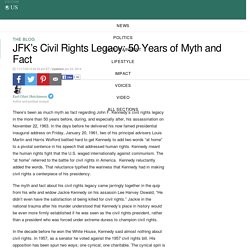
Kennedy’s civil rights legacy in the more than 50 years before, during, and especially after, his assassination on November 22, 1963. In the days before he delivered his now famed presidential inaugural address on Friday, January 20, 1961, two of his principal advisers Louis Martin and Harris Wofford battled hard to get Kennedy to add two words “at home” to a pivotal sentence in his speech that addressed human rights. Kennedy meant the human rights fight that the U.S. waged internationally against communism. The “at home” referred to the battle for civil rights in America. Kennedy reluctantly added the words. John Kennedy and Civil Rights. John F Kennedy is not automatically associated with civil rights issues as Kennedy’s presidency is more famed for the Cuban Missile Crisis and issues surrounding the Cold War.
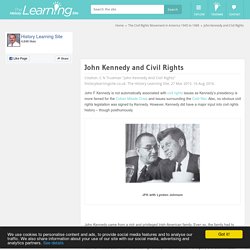
Also, no obvious civil rights legislation was signed by Kennedy. However, Kennedy did have a major input into civil rights history – though posthumously. John Kennedy came from a rich and privileged Irish-American family. Harry Truman and Civil Rights. Harry Truman is not a name usually associated with America’s Civil Rights movement if only because the main ‘points’ happened after his presidency – Montgomery, Little Rock, Birmingham, the careers of Martin Luther King and Stokely Carmichael.
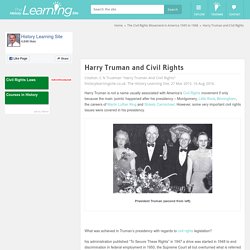
However, some very important civil rights issues were covered in his presidency. What was achieved in Truman’s presidency with regards to civil rights legislation? His administration published “To Secure These Rights” in 1947 a drive was started in 1948 to end discrimination in federal employment in 1950, the Supreme Court all but overturned what is referred to as Plessy v Ferguson. The 1957 Civil Rights Act. The Civil Rights Act of 1957 was introduced in Eisenhower’s presidency and was the act that kick-started thecivil rights legislative programme that was to include the 1964 Civil Rights Act and the 1965 Voting Rights Act.
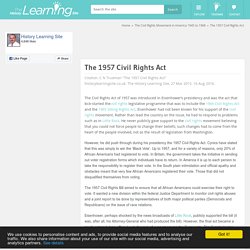
Eisenhower had not been known for his support of the civil rights movement. Rather than lead the country on the issue, he had to respond to problems such as in Little Rock. University of Alabama desegregated - Jun 11, 1963. Also on this day Lead Story On this day in 1979, John Wayne, an iconic American film actor famous for starring in countless westerns, dies at age 72 after battling cancer for more than a decade.
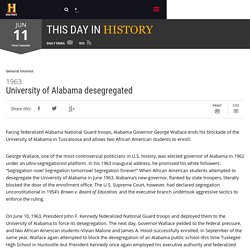
The actor was born Marion Morrison on May 26, 1907, in Winterset, Iowa, and moved as a child to Glendale, California.... American Revolution On this day in 1776, the Continental Congress selects Thomas Jefferson of Virginia, John Adams of Massachusetts, Benjamin Franklin of Pennsylvania, Roger Sherman of Connecticut and Robert R. Automotive The hit John Hughes-directed teen comedy “Ferris Bueller’s Day Off,” released on this day in 1986, stars a young Matthew Broderick as a popular high school student in suburban Illinois who fakes an illness in order to score a day off from school, then leads his best friend and his... Civil War On this day, a Confederate cavalry intercepts General Phillip Sheridan’s Union cavalry as it seeks to destroy a rail line near Trevilian Station, Virginia. Cold War Crime Music.
1962: Mississippi race riots over first black student. 1962: Mississippi race riots over first black student Two people have been killed and at least 75 injured in rioting at the University of Mississippi campus in Oxford.
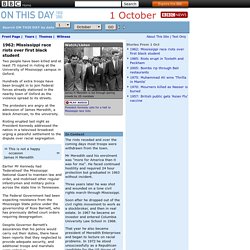
Hundreds of extra troops have been brought in to join Federal forces already stationed in the nearby town of Oxford as the violence spread to its streets. The protesters are angry at the admission of James Meredith, a black American, to the university. Rioting erupted last night as President Kennedy addressed the nation in a televised broadcast urging a peaceful settlement to the dispute over racial segregation. James Meredith. James Meredith was to make his name in civil rights history by being the first African-American to attend the University of Mississippi.
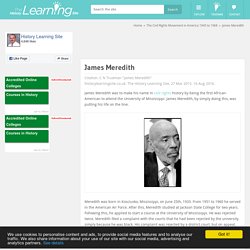
James Meredith, by simply doing this, was putting his life on the line. Meredith was born in Kosciusko, Mississippi, on June 25th, 1933. From 1951 to 1960 he served in the American Air Force. After this, Meredith studied at Jackson State College for two years. Following this, he applied to start a course at the University of Mississippi. On Violence and Nonviolence: The Civil Rights Movement in Mississippi. Poster, printed by the Student Nonviolent Coordinating Committee, questions the role of the Mississippi State Highway Patrol in violence against blacks.Courtesy, McCain Library and Archives, University of Southern Mississippi.
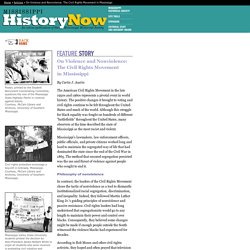
Civil rights protesters encourage a boycott in Grenada, Mississippi.Courtesy, McCain Library and Archives, University of Southern Mississippi. Mississippi Valley State University students protest the decision by then-President James Herbert White to expel all students who were involved in protesting civil injustice and curriculum issues, specifically the lack of a Black Studies program.Courtesy, McCain Library and Archives, University of Southern Mississippi. A Place in History: Historical Perspective on Martin Luther King Jr. Day. The US Civil Rights Movement (1942-1968) MLK Good or Bad Hindsight Article. Martin Luther King and the Movement.
By: Garry Crystal - Updated: 12 Dec 2016| *Discuss Martin Luther King and the movement for civil rights in America are inextricably linked.
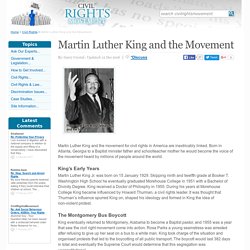
Born in Atlanta, Georgia to a Baptist minister father and schoolteacher mother he would become the voice of the movement heard by millions of people around the world. King’s Early Years Martin Luther King Jr. was born on 15 January 1929. The Montgomery Bus Boycott King eventually returned to Montgomery, Alabama to become a Baptist pastor, and 1955 was a year that saw the civil right movement come into action. Southern Leadership Christian Conference King was instrumental in forming the Southern Leadership Christian Conference (SLCC) in 1957. The Birmingham Protests In 1963 America had reached boiling point where racial discrimination was concerned. The March on Washington I Have a Dream The March on Washington ended with Martin Luther King Jr’s famous “I have a dream” sermon. Martin Luther King Jr.
Martin Luther King, Jr., (January 15, 1929-April 4, 1968) was born Michael Luther King, Jr., but later had his name changed to Martin. MLK and MX article Page 24 has been scanned twice! MLK info (ignore the highlighting!) Martin Luther King Jr. - Black History. The second child of Martin Luther King Sr. (1899-1984), a pastor, and Alberta Williams King (1904-1974), a former schoolteacher, Martin Luther King Jr. was born in Atlanta, Georgia, on January 15, 1929. Along with his older sister, the future Christine King Farris (born 1927), and younger brother, Alfred Daniel Williams King (1930-1969), he grew up in the city’s Sweet Auburn neighborhood, then home to some of the most prominent and prosperous African Americans in the country.
A gifted student, King attended segregated public schools and at the age of 15 was admitted to Morehouse College, the alma mater of both his father and maternal grandfather, where he studied medicine and law. Although he had not intended to follow in his father’s footsteps by joining the ministry, he changed his mind under the mentorship of Morehouse’s president, Dr.
Benjamin Mays, an influential theologian and outspoken advocate for racial equality. iWonder - Did Martin Luther King achieve his life's dream? Eisenhower and the Little Rock Crisis. Article on Chief Justice Earl Warren (member of the Supreme Court) Civil Rights: U.S. Supreme Court Decisions - FindLaw. From race and gender discrimination to sexual orientation discrimination and struggles over disability rights, civil rights cases are a very significant area of law that the U.S. Supreme Court has encountered on many occasions. Below is a list of U.S. Supreme Court decisions involving civil rights and discrimination. Race Discrimination Dred Scott v. Gender (Sex) Discrimination Roe v. Contributions of JFK and LBJ to the CRM. USA Supreme Court Hindsight Article. Education and Civil Rights. Education played a very important part in post-1945 civil rights history. Much time and effort was spent on education – the belief being that in a democracy it was only right and fair that all people regardless of skin colour should have the right to a decent education.
This issue of civil rights and education made international headlines with the affair that took place at Little Rock High School in 1957. But education was to remain at the forefront of civil rights even after this event. Civil Rights Timeline. Jan. 23 The 24th Amendment abolishes the poll tax, which originally had been instituted in 11 southern states after Reconstruction to make it difficult for poor blacks to vote. Civil Rights Movement - Black History. BBC Bitesize - National 5 History - Civil rights campaigns 1945-1965 - Revision 4. Overview of Civil Rights. African-American Civil Rights Movement (1954–68) Civil Rights Act. American civil rights movement.